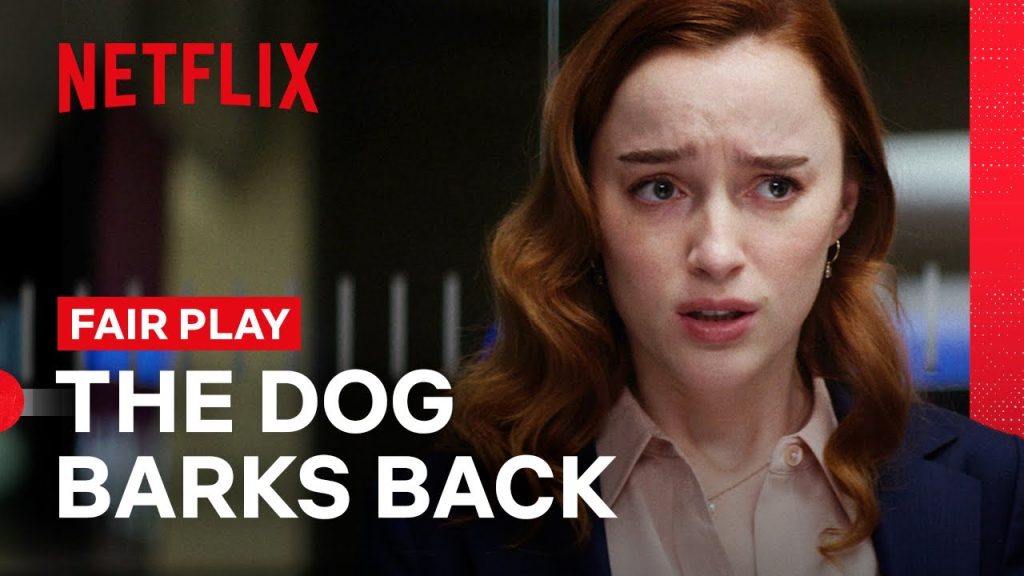Introduction:
Fair Play is not just a psychological thriller—it’s an autopsy of modern relationships suffocated by unchecked ambition, gendered power, and emotional gaslighting. Set within the high-stakes world of New York finance, the film dissects a romantic relationship under pressure, not from infidelity or tragedy, but from success—specifically, the woman’s.
Directed with simmering intensity and precision by Chloe Domont, Fair Play is a gripping character study masquerading as a corporate thriller. It interrogates how societal expectations of gendered power and professional status infect even the most personal, supposedly egalitarian bonds. With every look, silence, and withheld truth, the film becomes a slow-burning descent into emotional warfare.
This isn’t just a story about a couple—it’s a ruthless mirror for a society that teaches men to find worth in dominance and women to apologize for rising above.
Narrative Structure: The Architecture of Breakdown
The film begins innocently enough. Emily and Luke, two young analysts at a competitive hedge fund, are madly in love. They sneak kisses in bathroom stalls and dream of building a life together. But there’s one crucial catch: their relationship is a secret. Their firm forbids intra-office romances, making their bond both fragile and combustible.
The dynamic shifts sharply when Emily is unexpectedly promoted to portfolio manager—a position both assumed would go to Luke. From that moment on, what was once passionate and conspiratorial becomes cold, fractured, and deeply threatened.
The plot doesn’t unravel through external conflict—it implodes internally. The story turns not on action, but reaction. Luke begins to withdraw, then compete. Emily tries to prove her support for him, even while her own success threatens to emasculate him. Their apartment becomes a psychological battleground.
By the end, what started as love ends in ruin, humiliation, and a complete annihilation of trust. The final scenes are haunting not because of violence, but because of how eerily plausible they feel—how quickly intimacy turns into control, and admiration into resentment.
Characters: Portraits in Power and Performance
Emily (Phoebe Dynevor): The Earned Ascendant
Emily begins the film as a young, bright, and hardworking analyst. She’s driven, but not scheming; ambitious, but not ruthless. Her rise feels organic, born from talent and intelligence. But once promoted, she begins to see the cost of her elevation—not in the boardroom, but in the bedroom.
Her performance becomes a delicate dance of preservation—preserving her relationship, her integrity, her femininity, all while managing the ruthlessness of the finance world. Her attempts to support Luke—offering him connections, advice, even job leads—are met not with gratitude but wounded pride. She becomes the target of his passive aggression, then his overt hostility.
What makes Emily so tragic is her refusal to weaponize her power. She tries again and again to love Luke into peace, to lower herself to soothe his insecurity. But the more she gives, the more he takes. Her final act—breaking free and reasserting her agency—is not triumphant, but exhausted. She survives, but not without scars.
Emily is a study in the emotional labor women perform not just professionally, but relationally—to keep their partners comfortable, even at the cost of their own dignity.
Luke (Alden Ehrenreich): The Fragile Male Ego
Luke is charming, affectionate, and seemingly supportive—until he isn’t. His descent from loving partner to resentful saboteur is chillingly realistic. At first, he pretends to celebrate Emily’s promotion. But beneath the surface, a sense of emasculation festers. He believes he deserved it more. He needs to believe he is the alpha—even in a relationship built on equality.
Luke doesn’t explode all at once. He deteriorates slowly, like a crack forming in glass. A missed smile. A sarcastic jab. A sexual withdrawal. A drunken outburst. His efforts to reassert power become increasingly desperate—from refusing help, to undercutting her ideas, to finally lashing out physically.
Luke’s tragedy isn’t that he didn’t get the job. It’s that he cannot love a woman who outpaces him. His love was conditional, predicated on being her superior or equal. The moment she surpassed him, she stopped being a partner and became a threat.
He is not a villain in the traditional sense, but he is the embodiment of the subconscious patriarchal programming that teaches men to conflate love with dominance.
Themes:
1. Gender and Power: Success as a Threat
At its core, Fair Play is about how power destabilizes gender norms. In relationships shaped by traditional dynamics—even those claiming modern equality—there remains an unspoken expectation that the man leads, earns more, and holds social dominance.
Emily’s promotion violates this structure. Suddenly, she is the provider, the boss, the winner. And Luke can’t handle it. Not because he’s evil, but because he’s been socially conditioned to believe that his value lies in being “the man.”
Her rise triggers his collapse. Not due to injustice, but because it’s a reminder that in a meritocracy, women are not just equal—they’re often better. And that terrifies men who’ve built their self-worth around being irreplaceable.
The film doesn’t preach this—it shows it. The horror isn’t in dramatic speeches, but in subtle, cutting interactions. The way Luke watches Emily speak at work. The way he resists her success in bed. The way he frames her ambition as arrogance.
It’s not her success that ruins the relationship—it’s his inability to accept it.
2. Consent and Coercion: Sexual Dynamics as Battleground
One of the most disturbing aspects of Fair Play is how sex is weaponized. The intimacy that once bound them becomes transactional, then punitive. Emily’s attempts to initiate affection are rejected, mocked, or twisted. Luke begins to use sex to regain dominance, culminating in a traumatic final act that blurs the line between consent and assault.
This isn’t just about physical violation. It’s about the emotional erosion that leads to it. The quiet resentments. The need to reassert control. The rage at being emotionally inferior.
The film shows how coercion begins long before physical acts. It starts in manipulation, in emotional gaslighting, in the slow invalidation of someone’s autonomy.
The power imbalance bleeds into the bedroom, until even affection becomes a battleground.
3. Capitalism as Emotional Infrastructure
The hedge fund setting is not just a backdrop—it’s a metaphor. The world they inhabit is built on competition, hierarchy, and zero-sum thinking. You win by crushing others. You climb by stepping over bodies. Success is quantified in numbers, not loyalty.
This logic infects their relationship. Emily and Luke begin to treat each other like rival assets. Every act of kindness is audited. Every promotion is an imbalance. Their love becomes a ledger—one that must always be balanced.
In this way, the film suggests that capitalism doesn’t just structure our jobs—it structures our emotional lives. We begin to evaluate worth through performance, dominance, and transactional gain. Even love becomes a currency.
Symbolism and Visual Motifs:
- Mirrors: Frequently used to frame both Emily and Luke, mirrors symbolize duality—the public and private selves, the performance and the truth. In many scenes, characters are seen reflected, distorted, or split, representing their internal dissonance.
- Blood: A moment where Emily discovers blood on the bathroom floor becomes a visceral metaphor for hidden trauma, the violence beneath appearances, and the literal wounding of womanhood in male-dominated spaces.
- Apartments as Pressure Chambers: Their apartment, initially a space of refuge and intimacy, becomes a claustrophobic hell—a closed loop where emotions fester and explode. The domestic space becomes a trap rather than a haven.
Cinematic Tone and Tension:
The film’s tone is surgical. Cold lighting, sterile corporate offices, and tight framing create an atmosphere of mounting pressure. The sound design emphasizes silence—long pauses, stilted breaths, the quiet before the storm. Music is sparse, often dissonant, underlining psychological unease.
What makes the film haunting is its restraint. There are no melodramatic breakdowns or heroic monologues. The collapse is slow, inevitable. Every scene ratchets the tension, not with action, but with implication. You’re waiting for someone to finally say what’s really going on—and when they do, it’s already too late.
Ending: Reclamation or Ruin?
In the final act, Emily reclaims control—not in revenge, but in refusal. She refuses to be the caretaker of Luke’s ego. She refuses to hide her success. And most importantly, she refuses to be complicit in her own subjugation.
She leaves him. And the last shot—her standing alone, breathing, alive—is not triumphant in the cinematic sense. But it’s honest. It’s a woman choosing herself in a world that asked her to shrink.
Her escape is not from Luke, but from the idea that love must come at the cost of dignity.
Conclusion:
Fair Play is not just a cautionary tale—it’s a mirror to the invisible power plays that govern modern relationships. It asks terrifying questions: Can men love women who outshine them? Can romance survive capitalism? Can intimacy exist without dominance?
There are no heroes in this film. Only people trying—and failing—to love in a world where success is weaponized and masculinity is fragile. The tragedy is not that love failed. It’s that it was never built on fair play to begin with.
In the end, the film leaves you unsettled—not because of what it shows, but because of how real it feels. The real horror isn’t violence—it’s erosion. The slow disappearance of equality, safety, and trust.
This is not just a film—it’s a quietly devastating psychological excavation of modern gender politics, told through the ruins of a relationship that, in another life, might have survived.

